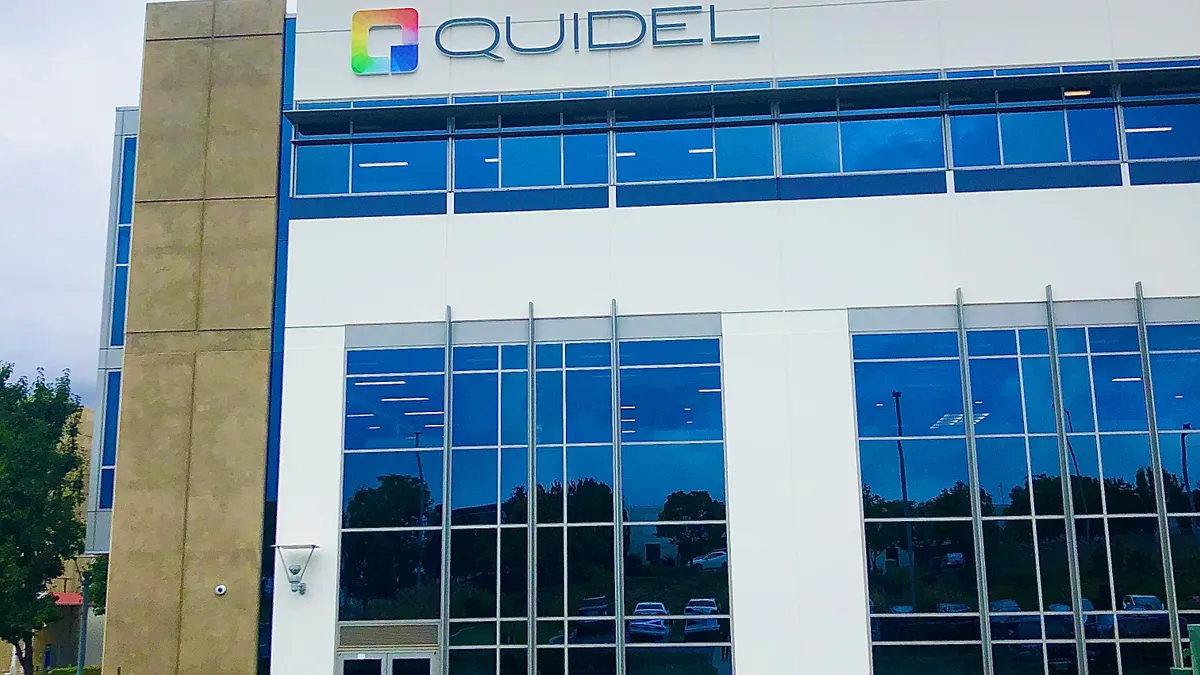Dive Brief:
-
Quidel is assessing whether it has the capacity to support COVID-19 antigen testing by retail, travel, entertainment, and sports operators to help open up the economy.
-
The point-of-care diagnostics maker sold $678.7 million of its coronavirus kits in the fourth quarter, up 81% sequentially, but still recently built up a "modest inventory" of tests for the first time, according to the company.
-
While Quidel evaluates whether it can sustainably serve both its existing professional market and new customers, William Blair analysts in a Friday note said it is difficult to "decipher" the current dynamics in the COVID-19 test market, adding that the "debate will rage whether the new testing scenarios will actually emerge into real opportunities or not and if testing in the professional setting will hold up or not."
Dive Insight:
Quidel's sales grew 432% year on year in the fourth quarter on the back of another jump in demand for its COVID-19 products, notably its antigen tests. The SARS-CoV-2 and coronavirus-flu combination tests generated $587.6 million in the quarter, more than Quidel's entire business made across all of 2019.
Talking to investors on a Thursday quarterly results call, Quidel CEO Doug Bryant said demand for tests spiked in November before falling away somewhat. The easing of demand, albeit to a level that until recently would have exceeded Quidel's capacity, has led to the build up of some inventory.
Quidel has potential buyers for the inventory. Throughout last year, Quidel lacked the manufacturing capacity to consider selling tests to the travel, entertainment, sports and dining industries. Now, with additional production capacity in place and plans to scale up to 50 million antigen tests per month, Quidel faces a decision about whether it can support existing customers while expanding into new markets.
"When you do the analysis on who could potentially fit into those categories, the number adds up on the sheet ... to about 400 million folks, and then you have to apply whatever frequency of testing you want to that model. You can get to some pretty big numbers pretty quickly," Bryant said. "We want to make sure if we make a commitment, let's say, for example, to doing airport testing, that we can handle the volume reliably and sustainably."
For the potential travel market, Craig-Hallum analyst Alex Nowak in a note said Quidel to date "has been solely committed to the professional area and does not wish to guarantee airport testing only to put customers on back order." However, Nowak expects Quidel to bring these new markets "online" as its manufacturing capacity ramps during 2021.
Bryant said Quidel will eventually become "super comfortable that we can supply everything that we're being asked to" and move into the new markets. Quidel is yet to reach that point but it could soon do so as soon as the first half of the year.
The new opportunities form part of an "avalanche of rapid testing" that Bryant expects to see as the need for rapid testing to reopen the economy outweighs lingering concerns about the sensitivity of antigen tests. Quidel sees a major opportunity to provide at-home COVID-19 testing, too, but plans to make its QuickVue SARS product available over the counter have been set back by a delay in getting positives in the asymptomatic population to support its FDA submission.
William Blair analysts said Quidel is still trying to enroll the 10 asymptomatic patients needed to meet the FDA requirements for the final review of the over-the-counter version of QuickVue. "As we wait for that clinical trial to wrap up and for capacity to expand, the [Quidel] team is in a bit of a holding pattern in terms of new growth drivers for COVID-19," they wrote. "Moving forward on the new use-cases is not possible yet."
Bryant on Thursday also addressed Quidel's approach to M&A, which came under scrutiny following a report that it was talking to Qiagen about a merger. The comments, which follow Qiagen's vow not to "dilute" its focus, appear to further diminish the prospects of the mooted deal happening.
"We continue to look at just about everything out there, most of which isn't a good fit for us, and we move on. But it's my hope that you would leave that to us to figure out, and in return I promise that we will not do anything stupid. We have cash and easy access to capital but are not compelled to acquire anything that isn't a great fit strategically. Bold claims by new competitors can be fun. And rumors can sometimes be fun, too. But sometimes rumors can be annoying and time consuming," Bryant said.
Quidel has $760 million in cash currently and no debt.










